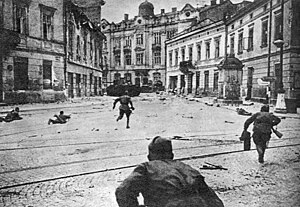Lvov–Sandomierz Offensive
| Lviv-Sandomierz Strategic Offensive Operation | |||||||
|---|---|---|---|---|---|---|---|
| Part of the Eastern Front of World War II | |||||||
 Soviet Soldiers in Lviv |
|||||||
|
|||||||
| Belligerents | |||||||
|
|
|
||||||
| Commanders and leaders | |||||||
|
|
(1st Ukrainian Front) |
||||||
| Strength | |||||||
| 900,000 men 900 AFVs 6,300 guns |
1,002,200 men 1,979 AFVs 11,265 guns |
||||||
| Casualties and losses | |||||||
| 55,000 killed, missing or captured 136,860 overall |
65,001 killed, missing or captured 224,295 wounded 289,296 overall 1,269 tanks and SP guns 289 aircraft |
||||||
![]() Josef Harpe (Army Group North Ukraine)
Josef Harpe (Army Group North Ukraine)
The Lviv–Sandomierz Offensive or Lviv-Sandomierz Strategic Offensive Operation (Russian: Львовско-Сандомирская стратегическая наступательная операция) was a major Red Army operation to force the German troops from Ukraine and Eastern Poland. Launched in mid-July 1944, the Red Army achieved its set objectives by the end of August.
The offensive was composed of three smaller operations:
The Lviv–Sandomierz Offensive is generally overshadowed by the overwhelming successes of the concurrently conducted Operation Bagration that led to the destruction of Army Group Centre. However, most of the Red Army and Red Air Force resources were allocated, not to Bagration's Belorussian operations, but the Lviv-Sandomierz operations. The campaign was conducted as Maskirovka. By concentrating in southern Poland and Ukraine, the Soviets drew German mobile reserves southward, leaving Army Group Centre vulnerable to a concentrated assault. When the Soviets launched their Bagration offensive against the Army Group, it would create a crisis in the central German front, which would then force the powerful German Panzer forces back to the central front, leaving the Soviets free to pursue their objectives in seizing the Vistula bridges and gaining a foothold in Romania.
...
Wikipedia
